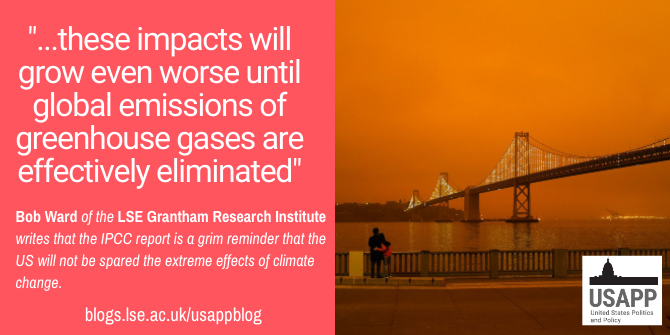 This week the Intergovernmental Panel on Climate Change (IPCC) released the first part of its 6th assessment report on climate change, confirming that global temperatures have risen due to emissions of greenhouse gases from human activities. Bob Ward reflects on the report, and the Biden administration’s response to it, highlighting its conclusions that climate change means that the US will continue to see more extreme climate events such as hurricanes, wildfires and drought.
This week the Intergovernmental Panel on Climate Change (IPCC) released the first part of its 6th assessment report on climate change, confirming that global temperatures have risen due to emissions of greenhouse gases from human activities. Bob Ward reflects on the report, and the Biden administration’s response to it, highlighting its conclusions that climate change means that the US will continue to see more extreme climate events such as hurricanes, wildfires and drought.
A grim new report on climate change by the world’s leading scientists should be focusing the minds of decision-makers across the political spectrum in the United States. The Intergovernmental Panel on Climate Change (IPCC) published its latest assessment on ‘The Physical Science Basis’ on 9 August, after governments had approved line-by-line a 41-page summary of a report that is nearly 4000 pages in length.
The report was written by 234 authors drawn from universities and other institutions in 66 countries, who reviewed more than 14,000 journal papers and other pieces of evidence. It is the most rigorous overview of climate science since the IPCC’s last major assessment in 2013.
An unequivocal report and a future of climate extremes
The Summary for Policymakers provides a stark snapshot of the current state of scientific knowledge.
It points out that global temperature has climbed by more than one Celsius degree since the second half of the 19th century and concludes that this warming is entirely due to emissions of carbon dioxide and greenhouse gases from human activities, particularly the burning of fossil fuels.
It indicates that global average temperature is now at its highest level for 125,000 years, and that “the scale of recent changes across the climate system as a whole and the present state of many aspects of the climate system are unprecedented over many centuries to many thousands of years”.
Significantly, the report finds that “human-induced climate change is already affecting many weather and climate extremes in every region across the globe”, and “evidence of observed changes in extremes such as heatwaves, heavy precipitation, droughts, and tropical cyclones, and, in particular, their attribution to human influence, has strengthened” over the past eight years.
The authors were only able to review evidence that had been documented by January 2021, so did not take into account the extreme weather events that have been taking place across the world over the past few months. Researchers have calculated that the extreme heatwave in western North America at the end of June 2021 would have been “virtually impossible” without climate change.
But the report’s projections for the future are even more bleak. It states that these impacts will grow even worse until global emissions of greenhouse gases are effectively eliminated. This means “increases in the frequency and intensity of hot extremes, marine heatwaves, and heavy precipitation, agricultural and ecological droughts in some regions, and proportion of intense tropical cyclones, as well as reductions in Arctic sea ice, snow cover and permafrost.”

Photo by Thom Milkovic on Unsplash
Climate change effects in North America
The IPCC also published alongside the report factsheets for each region, including North and Central America. It shows that climate change is expected to cause further warming across the continent, with the biggest rises in temperature in northern Canada and Alaska.
The IPCC also suggests that sea level rise will lead to more flooding and erosion along most coasts, and there is “medium confidence” that “tropical cyclones (with higher precipitation), severe storms, and dust storms are expected to become more extreme (Caribbean, US Gulf Coast, East Coast, Northern and Southern Central America)”. In addition, increases in drought and “fire weather” are likely to occur in western and central North America, including the western states of California, Oregon and Washington, which have been experiencing devastating wildfires this year.
These findings are consistent with the results of the Fourth National Climate Assessment, which was published in two volumes in 2017 and 2018 by the United States Global Change Research Program.
The IPCC report describes five scenarios for future global emissions. In the most extreme case, global emissions are assumed to triple over the next 60 years and global temperature rises by more than 4 Celsius degrees by 2100 compared with the late 19th century. However, it also provides two scenarios that are consistent with the temperature targets of the Paris Agreement, which commits countries to “holding the increase in the global average temperature to well below 2°C above pre-industrial levels and pursuing efforts to limit the temperature increase to 1.5°C”.
Partisan responses to the IPCC report in the US
President Biden initiated the process for the United States to re-join the Paris Agreement on his first day in office, reversing the Trump Administration’s withdrawal. The Biden Administration has subsequently committed the United States to cutting its annual emissions of greenhouse gases by 50 to 52 per cent by 2030 compared with 2005, and has set a domestic policy goal of reaching net zero emissions by 2050.
In one of the new IPCC scenarios, global emissions reach zero soon after the middle of this century and are negative over the following decades. This could be achieved if emissions are cut to low levels and outweighed by the amount of carbon dioxide removed from the atmosphere by planting more trees and vegetation, or by artificial methods of capture and storage. In this case, global temperature could reach 1.5 Celsius degrees above its late 19th century level by about 2050 but would subside slightly by 2100.
In another scenario, global emissions reach net zero and become negative by about 2075, with warming limited to about 1.8 Celsius degrees by 2100 compared with the late 19th century.
The Biden Administration responded to publication of the IPCC report with a statement by the President’s Science Advisor, Dr Eric Lander: “Today’s report from the Intergovernmental Panel on Climate Change (IPCC) confirms with rigorous science what we’re seeing with our own eyes — that climate change is intensifying faster than we thought”. He added: “As the pace of climate change accelerates, so too must our urgency to act. We have to work together now to build a net-zero carbon future.”
By contrast, Republicans in Congress responded to the report’s publication in a way that still had some echoes of the Trump Administration’s hopeless approach to climate change, although they did not dismiss it as a Chinese hoax as Trump did. Representative Garret Graves of Louisiana, the ranking member of the Select Committee on the Climate Crisis, told reporters: “While today’s report highlights the urgency of climate change, we must ensure we approach this issue the right way…We can’t cut global emissions through domestic punitive action that will outsource American jobs, hurt U.S. competitiveness, and increase global emissions in the process. We must avoid policies that rely on higher taxes, increased regulations, and ensure us being under the thumb of China.”
Please read our comments policy before commenting.
Note: This article gives the views of the author, and not the position of USAPP – American Politics and Policy, nor of the London School of Economics.
Shortened URL for this post: https://bit.ly/2VJiFXY
 Bob Ward – LSE Grantham Research Institute on Climate Change and the Environment
Bob Ward – LSE Grantham Research Institute on Climate Change and the Environment
Bob Ward is policy and communications director at the Grantham Research Institute on Climate Change and the Environment at the London School of Economics and Political Science.






